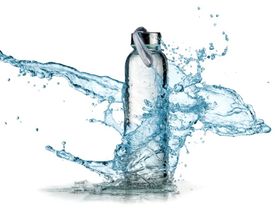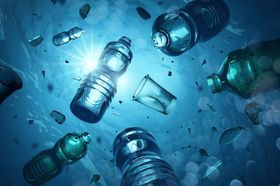Do Water Filtration Systems Work?
Water filters promise cleaner sips by removing contaminants. We reveal if they might just be what you need to finally to switch to tap.
Published July 2, 2024.

About 45% of the US tap water contains polyfluorinated alkyl substances (PFAS). These contaminants are aptly named "forever chemicals" because they don't decompose in the environment or our bodies.
The consequences of these chemicals are still being researched, but there's evidence that they cause many conditions like kidney and testicular cancer. Many people are now turning to filtration systems to ensure they have a safe source of hydration, but do they work?
» Filter contaminants and enrich your water with a full-cycle method
How Effective Are Water Filters?
Communities in developing countries are dramatically decreasing waterborne diseases via filtration systems. Does this mean they work? Not all the time. Because they're made for a household or point-of-use system, you shouldn't rely on them if there are systemic issues with the water supply.
Plus, not all of these devices use the same technology, and their effectiveness varies based on the chemical they target.
» Enhance your drinking experience with these alternatives to tap water
Types of Water Filters
Mechanical Filters
Also called a sieve filter, this system uses a fine mesh screen to trap particles. You can often see it in water pitchers, where it removes:
- Sediment: Sand, silt, dirt, and other debris visible to the naked eye.
- Rust: Flakes or particles of rust that can discolor and affect the taste of water.
- Organic matter: Leaves, twigs, insects, and other organic materials.
- Large parasites: Depending on the filter's pore size, it can remove bigger parasites like protozoan cysts.
Pros
- Relatively affordable
- Improves taste and odor
Cons
- Requires regular filter replacement
- Doesn't remove all microorganisms
Note: Because mechanical filters don't remove chemicals, PFAS, or microorganisms, they're usually the first line of filtration in house systems.
» How to choose the best water pitchers for your home
Reverse Osmosis
Reverse osmosis systems force water through a semi-permeable membrane. It traps contaminants on one side while allowing purified water to pass. They effectively remove:
- PFAS: As we already mentioned, these man-made chemicals can cause testicular and kidney cancer. Because they are larger than water molecules, the membrane stops them in their track.
- Contaminants: Lead, arsenic, mercury, and certain pesticides that can cause vascular damage, immune system dysfunction, birth defects, and cancer.
- Dissolved Solids: Inorganic salts, minerals, and even some microorganisms. Reverse osmosis filters also reduce the total dissolved solids, reducing water hardness caused by calcium and magnesium.
- Impurities: Chlorine and chloramines are common disinfectants in municipal water supplies.
Pros
- Removes a wide range of contaminants
- Produces very clean, fresh-tasting water
Cons
- Removes beneficial minerals
- May waste some water during filtration
» Understand how RO targets the pharmaceuticals lurking in tap water
Carbon Filters
Activated carbon is a highly porous material that attracts and holds onto contaminants like a magnet and holds onto them on its surface. Some types of filters use it to remove:
- Chlorine and Chloramines: Disinfectants in municipal water supplies affect taste and odor.
- Volatile Organic Compounds: Organic chemicals that come from industrial processes or agricultural runoff.
- Taste and Odor Impurities: Anything that makes your water unpleasant to drink, like chlorine byproducts or industrial fumes.
- Certain Heavy Metals: Lead or mercury, depending on the specific filter and contaminant.
Pros
- Removes specific contaminants
- Improves taste and odor
Cons
- Requires regular filter replacement
- Not suitable for all water sources
» Understand how to recognize the signs of contaminated water
Ultraviolet Purifiers
These devices deactivate microorganisms with a specific wavelength of UV light, targeting:
- Bacteria: E. coli, Salmonella, Legionella, and other pathogens that can cause gastrointestinal and other illnesses.
- Viruses: Hepatitis A, rotavirus, and some enteroviruses can be susceptible to UV treatment, which disrupts viral replication by damaging their genetic material.
- Protozoa: Parasites like Giardia can be vulnerable to UV light depending on the size of the organism.
Pros
- Simple maintenance
- Removes microbes
Cons
- Not 100% effective
- Relies on clear water for effective filtration
» Learn more about how UV filtration can remove bacteria from water
Pros and Cons of Using a Water Filtration System
Pros
- Enhanced Health: Water filters can potentially reduce the risk of long-term health problems associated with exposure to contaminants like lead, arsenic, and chlorine byproducts by eliminating them.
- Protection for Appliances: They can extend the lifespan of appliances like coffee makers and kettles by reducing mineral buildup that can clog or damage them.
- Improved Taste and Odor: By removing chlorine, they can eliminate unpleasant tastes and odors, making your water more palatable and refreshing.
- Improved Cooking: Some filters remove impurities that affect the taste and quality of cooked food. For example, they can result in more transparent ice cubes and better-tasting coffee.
- Environmental Benefits: Reducing reliance on bottled water can help decrease plastic waste and the environmental impact associated with plastic bottle production and transportation.
- Cost-Effectiveness: In the long run, it can be more economical than constantly buying bottled water. The initial investment is typically offset by the savings on bottled water over time.
» Know what you're drinking. Learn more about the minerals in your water
Cons
- Limited Removal: Some filters remove specific contaminants, so you need to figure out which one is the best for your needs.
- Maintenance: Some devices need frequent cartridge replacements, while others require periodic cleaning and disinfection. Neglecting maintenance reduces effectiveness and leads to contamination.
- Reduced Minerals: Certain filters, like RO systems, can remove beneficial minerals like calcium and magnesium from the water. While they may not be harmful, you should remineralize your water if you decide to get one.
» Discover the healthiest types of water to drink
Unlock Cleaner, Healthier Drinking Water
Water filters are valuable tools for improving the quality and safety of drinking water. Their effectiveness hinges on two key factors: the type of filter chosen and the specific contaminants you want to remove.
Simpler options like mechanical or carbon filters can be sufficient for essential filtration. However, if you're concerned about a broader range of contaminants, including heavy metals, bacteria, viruses, and emerging chemicals like PFAS, a more robust filtration system is necessary.
The MAYU | Full Cycle package offers a multi-step approach to water filtration. It uses RO for thorough purification, effectively removing a broad spectrum of impurities. To address the loss of minerals during RO, MAYU includes mineral drops to ensure your water retains its essential nutrients.
Finally, the MAYU Swirl uses vortexing technology to create structured water. The result is more than just clean water. You get peace of mind knowing you're providing your body with the purest, most beneficial drinking experience possible.








